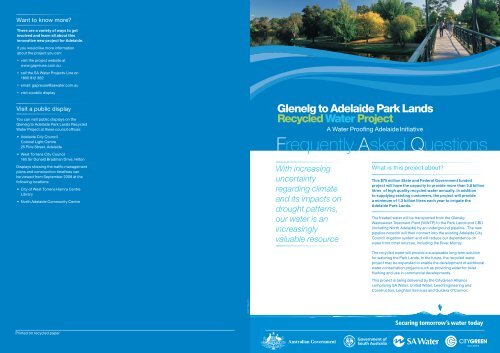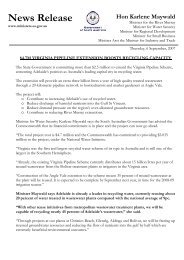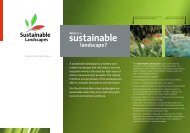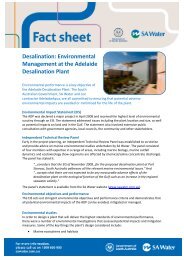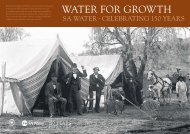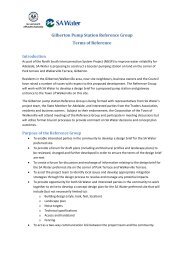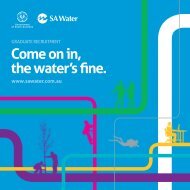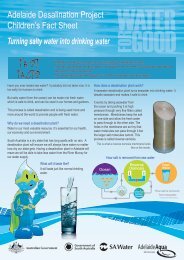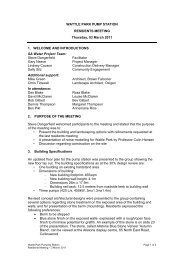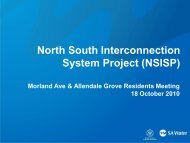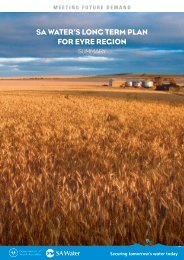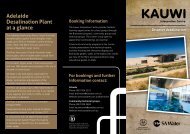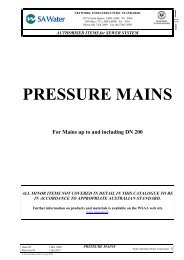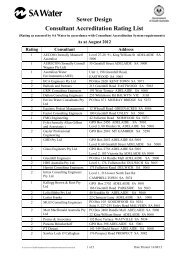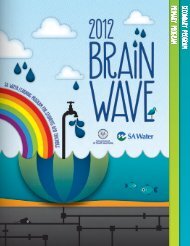Frequently Asked Questions - SA Water
Frequently Asked Questions - SA Water
Frequently Asked Questions - SA Water
Create successful ePaper yourself
Turn your PDF publications into a flip-book with our unique Google optimized e-Paper software.
Want to know more?There are a variety of ways to getinvolved and learn all about thisinnovative new project for Adelaide.If you would like more informationabout the project you can:• visit the project website atwww.gapreuse.com.au• call the <strong>SA</strong> <strong>Water</strong> Projects Line on1800 812 362• email: gapreuse@sawater.com.au• visit a public displayVisit a public displayYou can visit public displays on theGlenelg to Adelaide Park Lands Recycled<strong>Water</strong> Project at these council offices:• Adelaide City CouncilColonel Light Centre25 Pirie Street, Adelaide• West Torrens City Council165 Sir Donald Bradman Drive, HiltonDisplays showing the traffic managementplans and construction timelines canbe viewed from September 2008 at thefollowing locations:• City of West Torrens Hamra CentreLibrary• North Adelaide Community Centre<strong>Frequently</strong> <strong>Asked</strong> <strong>Questions</strong>With increasinguncertaintyregarding climateand its impacts ondrought patterns,our water is anincreasinglyvaluable resourceWhat is this project about?This $75 million State and Federal Government fundedproject will have the capacity to provide more than 3.8 billionlitres of high quality recycled water annually. In additionto supplying existing customers, the project will providea minimum of 1.3 billion litres each year to irrigate theAdelaide Park Lands.The treated water will be transported from the GlenelgWastewater Treatment Plant (WWTP) to the Park Lands and CBD(including North Adelaide) by an underground pipeline. The newpipeline network will then connect into the existing Adelaide CityCouncil irrigation system and will reduce our dependence onwater from other sources, including the River Murray.The recycled water will provide a sustainable long term solutionfor watering the Park Lands. In the future, the recycled waterproject may be expanded to enable the development of additionalwater conservation projects such as providing water for toiletflushing and use in commercial developments.This project is being delivered by the CityGreen Alliancecomprising <strong>SA</strong> <strong>Water</strong>, United <strong>Water</strong>, Leed Engineering andConstruction, Leighton Services and Guidera O’Connor.3237FAQ_0408Printed on recycled paper
What is recycled water?Recycled water is water derived fromwastewater systems and treated to astandard which is satisfactory for itsintended use.This project will ensure that the recycledwater is appropriate for non potable use.What are the benefits?• Reduced annual discharge of treatedwastewater to the Gulf St Vincent• Reduced dependence on other watersources , such as the River Murray• Improved health of the River Torrensand quality of the water in TorrensLake through reduced demand andimproved managementWhen will it happen?With the planning and design stagesnow complete, construction willcommence in September 2008, withthe fi rst recycled water planned to beavailable for use in the Park Lands bymid 2010.What infrastructure will bedeveloped?• A new water treatment facility atGlenelg WWTP• Recycled water storage tanks andpump station onsite at Glenelg WWTP• An underground pipeline from Glenelgto the Adelaide Park Lands• An underground pipeline networkaround the Park Lands, incorporatingNorth Adelaide and the CBDWhat construction isinvolved?The pipeline from Glenelg to the ParkLands will be approximately eightkilometres in length with a diameter of750mm. It will be constructed within atrench around 1.5 metres wide or boredunderground.The pipeline network around thePark Lands will be approximately 34kilometres in length, using pipes rangingin width from 50mm – 525mm.Depending on local conditions andsurvey results, the pipelines will beburied approximately 1.2 to 1.5 metresunderground.The newpipelinenetwork willprovide thebasis foradditionalrecycled waterprojectsHas the pipeline routebeen decided?Considerable consultation, planningand engineering assessment wasundertaken to identify the final route.Some minor changes to the route mayalso be required in the case of avoidingunderground infrastructure, Aboriginalor European heritage items or signifi canttrees.Will there be disruptionsduring construction?Some changes to traffic movements,property and Park Lands access will berequired during pipeline construction.However, we will work to keepdisruptions to a minimum.How will disruptions bemanaged?Residents, businesses and ParkLand users will be kept informed ofthe construction schedule and trafficmanagement plans to minimise anydisruptions.A high level of communication withresidents, businesses and Park Landsusers will be provided through doorto door visits, letters to residents andbusinesses, council and shoppingcentre displays and information flyers.Properties directly adjacent to thepipeline route will be kept up to date onconstruction dates and any disruptions.Construction work will be undertakenin liaison with local councils and theDepartment of Transport, Energyand Infrastructure to minimise traffi cdisruption and maintain access.Micro-tunnelling techniques will beused to bore underneath major roads toensure traffic flow is maintained.Who sets the standardsfor recycled water?The recycled water used for thisproject must comply with the rigorousstandards set out in the AustralianGuidelines for <strong>Water</strong> Recycling.What aboutenvironmental impacts?A best-practice Adaptive ManagementFramework will guide the sustainableand low impact irrigation of theAdelaide Park Lands with recycledwater. The framework covers generalirrigation areas as well as issues orareas of specific vulnerability such assensitive vegetation, soil, surface andgroundwater.What about heritagematters?Heritage surveys of the pipelineroute have been undertaken for bothAboriginal and European heritage items.No listed heritage items will be impactedby the project and consultation isoccurring with appropriate organisationsto ensure there are no negative impactson items or locations of heritage andcultural value.What will happen in thefuture?The project provides the backboneinfrastructure for new recycled waterprojects and sustainable development inthe CBD and suburbs.If you work for an organisation thatwould like to access the recycled waterin the future, please contact the <strong>SA</strong><strong>Water</strong> Projects Information Line on 1800812 362. While additional water users arenot part of the current project, there ispotential for the project to be expandedin the future.<strong>Frequently</strong><strong>Asked</strong><strong>Questions</strong>Adelaide City Council will also developcomprehensive Irrigation Managementand Monitoring Plans (IMMPs) for eachpark, garden and open space requiringregular watering. The IMMPs will takeinto account:• water application rates, to minimisethe potential for runoff and waterlogging• current and future water table levels• soil structure and condition• soil and groundwater salinityIn addition to this ongoing approachto environmental management,Environmental Management Planswill be prepared by the CityGreenAlliance and Adelaide City Council forconstruction and operations elements ofthe project.Using recycledwater in thePark Landswill helpconserveSouthAustralia’swaterresources


